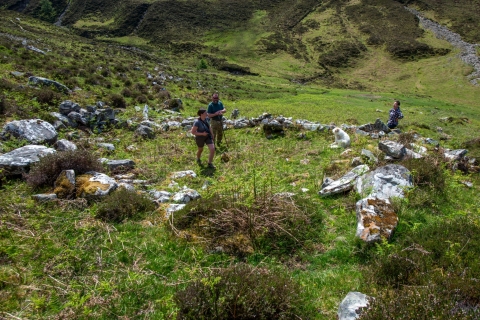Looking for the lost communities of brutal Highland Clearances

Ullapool Museum is leading the two-year community project investigating the sites of two Highlands townships cleared of all their residents by a landowner 200 years ago. Archaeological digs have started at the sites of two Highlands townships, Inverlael and Balblair, near Ullapool. Ullapool (Scottish Gaelic: Ulapul) is a coastal village in Ross and Cromarty in the Scottish Highlands. Ullapool Museum is encouraging members of the local community to become involved in the first week of Archaeology Digs from the 5th to the 10th of October.
Ullapool Museum has pointed out that little was known of the "lost" communities that were subject to an eviction described as "brutal", with violence was used against the occupnts. The museum have historical records dating Inverlael to at least the 13th Century, however, most of what little information known of the townships has been "preserved through oral tradition handed down through generation of local families". The communities were cleared within about five years from land and homes and land where generations of people had lived. Many emigrated and the land turned over to sheep farming.
The dark period of Scottish history known as the Highland Clearances were enforced after the defeat of the Jacobite Risings (1648-1746). In 1745 Charles Edward, the Young Pretender (called “Bonnie Prince Charlie”), led the fifth Jacobite rebellion. He won support among the Scottish Highlanders to battle against the English. At the Highlanders still followed the clan system, which had been in place for hundreds of years. Defeat at the Battle of Culloden (April 16, 1746), resulted in thousands of Highlanders being killed. In the subsequent weeks and months hundreds of Highlanders were hunted and killed. In the process, whole Highland clans were destroyed or were forced to flee.
Although the clan system had been slowly changing in the years before Culloden, the defeat allowed the English government to drive forward a policy of destroying the Gaelic culture that underpinned it. Including for a period of time the banning of clan tartans and bagpipe music. The government opened the way for outsiders to acquire much of the land in the Highlands, although some existing clan chiefs bore responsibility for what was to happen. Over the years that followed common lands and the long standing tenant rights of the people were taken away. Those tenants seen to be surplus to requirements were ‘cleared’ off the estates from about 1780. The Clearances were continuing nearly 70 years later at the time of the potato famine in 1846.
Link and Image: Ullapool Museum Ullapool Museum Lost Inverlael: A' lorg Baile Bhlàir.





